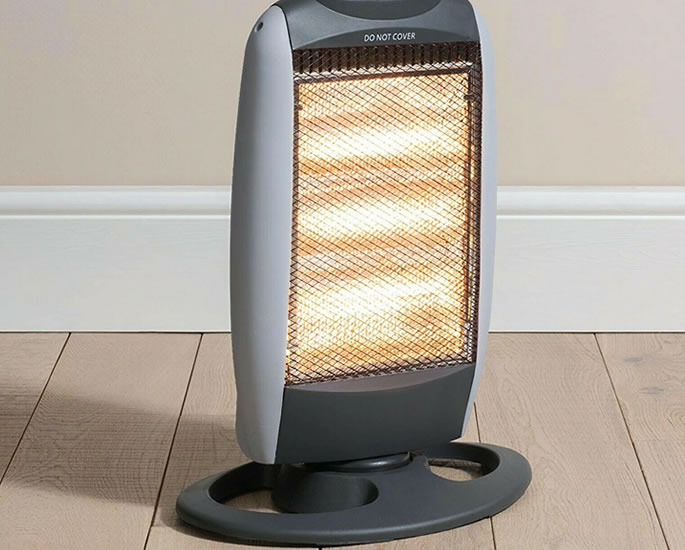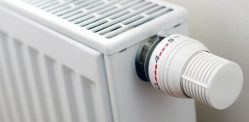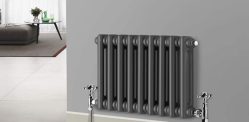"portable heaters can be useful to heat a small space"
As the weather gets colder, more households are inclined to heat their homes to keep warm. But what is better, central heating or a heater?
The rise in energy bills means some people are trying to find cheap ways to keep warm.
When it comes to cheap ways to keep warm, one solution could be an electric heater which is used to heat just one or two rooms.
Electric heaters are portable machines that plugin and can heat a single room.
Since the increase in energy bills, their popularity has increased and charity Electrical Safety First found 42% of people will either definitely use or are considering using an electric heater to warm up a space.
However, the charity highlighted the dangers of leaving the machines unattended, on unstable surfaces or when being used to dry clothes.
Although they are not naturally dangerous, they could cause fires if not used with care.
The charity said fan heaters posed a greater risk in the home.
Lesley Rudd, chief executive of Electrical Safety First explained:
“Heating your home should never come at the expense of your own safety.
“While portable heaters can be useful to heat a small space, they can pose a real risk to your home and your life if mistakes are made when using them.
“With the significant number of people set to turn to these appliances this winter, it is vital we use them safely.”
Those using a heater should ensure:
- The device is on a level surface, well away from anything or anyone that could knock it over.
- It is well away from combustible materials, such as paper, furniture or curtains.
- It is never used to dry clothes.
- It is never left unattended for long periods while in use, or while you are asleep.
- Extension leads are not used to power a heater as they can easily be overloaded
Other advice, which can be seen on the charity’s website includes buying the unit from a reputable retailer, checking for recalls, and ensuring a working smoke alarm is fitted on every floor of the home.
Some of the best options were found by Mumsnet.
Dimplex Oil-Filled Radiator

This radiator works the “same way as a traditional wall radiator”.
The experts said: “Thermal oil is heated within the radiator and the heat radiates outwards, making them a good choice for heating one room without having to heat the whole house.”
Like traditional radiators, oil-filled units take around 20 minutes to heat up so they are best for sustained heat over several hours.
Those on Mumsnet liked the unit as it stays warm for a long time after being turned off and it has three heat settings and an automatic cut-out switch, making it both fire-safe and energy efficient.
Daewoo Halogen Heater

For a “fast-acting blast of heat, a halogen heater is a cheap, efficient option”.
The halogen elements direct heat at objects in front of them, so it’s perfect for warming yourself up first thing in the morning, or for if you work outdoors.
Mumsnet said:
“If you’re looking to heat a whole room, a halogen heater probably isn’t the best choice.”
This model is said to be light, and portable and comes with three heat options and an oscillating function.
The halogen elements also provide a source of light, and an automatic cut-off switches off the heater if it falls over, so there are no worries about safety.
John Lewis Tower Fan Heater

Fan heaters warm up a room quickly by blowing air over a heated element.
This unit comes with an adjustable thermostat, two heating levels, and an automatic cut-off in case it tips over.
The anti-frost setting allows the heater to come on automatically if the room temperature drops below 5°C.
Great for a quick blast of heat, but less good for keeping a room warm over a long period, as the heat is quickly lost once the fan is turned off.
These units are seen as a cheaper alternative to central heating for heating up a single room or office, especially amid the rise in energy prices.
As of October 2022, the average prices for gas and electricity as follows (according to Ofgem).
- 10.33p per kWh for gas
- 28.49p per day for gas standing charge (£103.98 per year)
- 34.04p per kWh for electricity
- 46.36p per day for electricity standing charge (£169.21 per year)
Therefore, you can use a smart meter or another form of measurement, to see if this approach saves you money in the longer term.
However, it is important that you look at your heating costs in terms of gas versus electricity. Since gas is cheaper than electricity, you might want to compare the cost over a short period of time.






























































